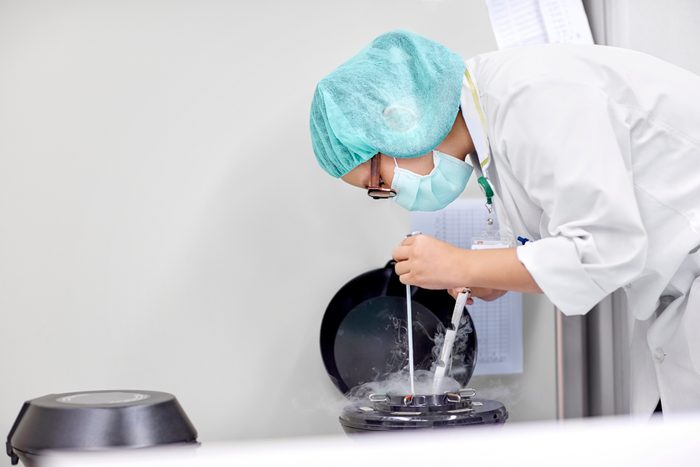
Egg freezing and IVF are two different things
Although egg retrieval is part of both procedures, the goal with in vitro fertilization (IVF) is usually to get pregnant and have a baby as soon as possible.
“When those eggs are retrieved with IVF, they are fertilized with sperm to create an embryo that’s transferred to the woman’s uterus,” explains Joshua Klein, MD, chief medical officer and reproductive endocrinologist at Extend Fertility in New York City. “While, with egg freezing, the process is complete after the egg retrieval—there’s no creation of an embryo, because the goal for now is simply to preserve a woman’s unfertilized eggs for the future.”
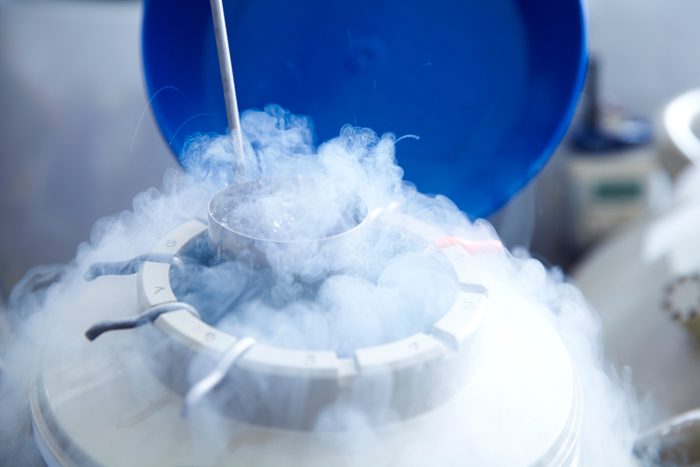
There are many reasons women choose to freeze their eggs
Many people think egg freezing is for women later in their childbearing years who are running out of time, but this is not always the case. “Egg freezing is viewed as a way to stop the ‘biological clock,’ but it provides many other options than that,” explains Melvin H. Thornton, MD, medical director at CT Fertility. “Even if you’re still in your early childbearing years but not ready to start your family just yet, freezing your eggs sooner rather than later improves your odds of having a baby in the future.”

Your body has fewer eggs as you age
Most women are born with about two million eggs, which are stored deep in the ovaries in small water balloon-like pockets called follicle cysts. As you age, your eggs age with you and deplete throughout your lifetime.
“As an analogy, a dog year is 7:1 human years and an egg year is 2:1 human years,” says Angeline Beltsos, MD, who is board certified in obstetrics and gynecology, reproductive endocrinology and infertility and CEO of Vios Fertility Institute in Chicago. “So, at 40 years old, the egg is like an 80-year-old person.”
In other words, just like us, eggs begin to age, which results in a lower chance that they’ll result in a pregnancy.
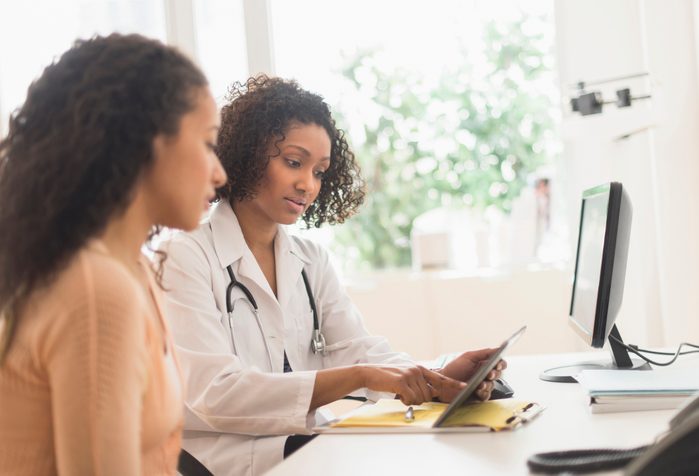
It’s OK start thinking about freezing your eggs before age 35
Doctors and egg-freezing specialists say the best time to freeze your eggs is in your late 20s or early 30s, as this gives you the best chances of pregnancy later on. But even if you are in your late 30s or early 40s, you’re still a candidate for egg freezing.
“If you are a healthy woman older than 38, do not wait to meet with an infertility doctor and consider freezing your eggs,” advises Sherry Ross, MD, ob-gyn, author of She-ology: The Definitive Guide To Women’s Intimate Health. Period. “Women older than 40 are still candidates for freezing, but their success rates in having a baby are less than 10 percent.”
However, it’s important to note that egg quality and quantity differ from person to person. “A yield from egg freezing cycle depends on a number of things—your age, medical history, how you respond to medications, etc.,” says Dr. Thornton. “But, statistically speaking, a woman who freezes 15 eggs at age 30 has about a 30 percent chance of giving birth to a child if she uses these eggs, while a woman who freezes 25 eggs at age 30 has about a 40 percent chance of giving birth to a child.
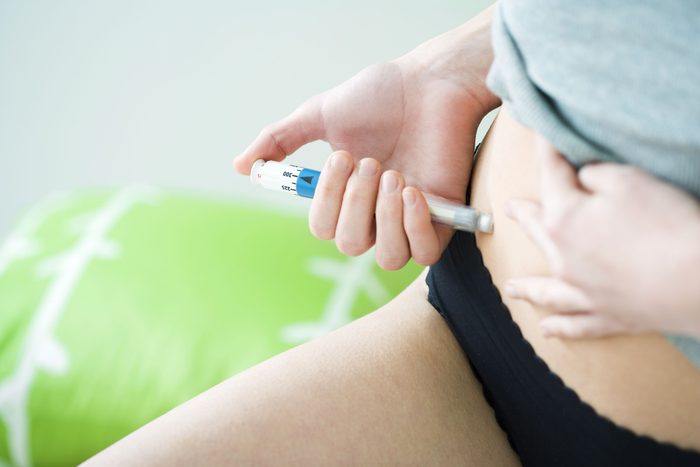
It can take several months to complete
Egg freezing is a relatively quick process. “You really only need to do three things: meet with a fertility doctor to decide if he or she is someone you feel comfortable with, undergo some basic hormone and infectious disease testing, and order your medications,” explains Sheeva Talebian, MD, reproductive endocrinologist at Colorado Center for Reproductive Medicine. In most cases, this takes only a few weeks and requires an occasional appointment every few days.
At her initial consultation, a woman will typically have an ultrasound and a blood test for AMH (anti-mullerian hormone) to assess her ovarian reserve). After she’s had a period, either from the birth control pill or spontaneously, she takes about 10 days of fertility shots before undergoing a procedure to retrieve the eggs, says Alan B. Copperman, MD, director of the division of reproductive endocrinology and vice-chairman department of obstetrics, gynecology and reproductive science at Icahn School of Medicine at Mount Sinai.
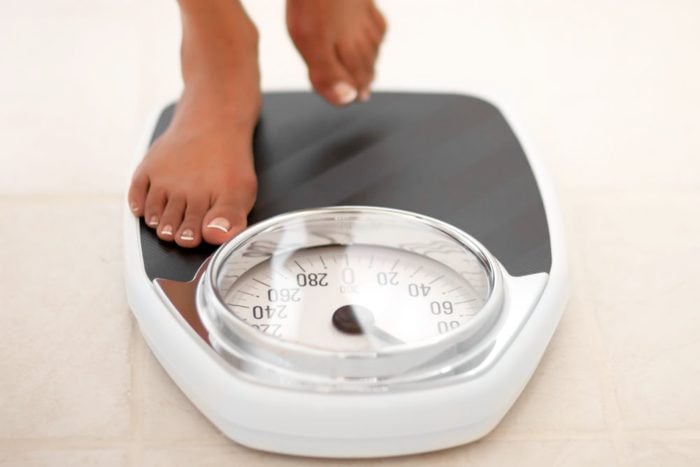
It might make you gain weight
This is one of the top questions fertility experts are asked when patients inquire about egg freezing, and the short answer is yes, there will be bloating involved in the process, mainly caused by the fertility medications you have to take. “You can expect to gain a few pounds of water weight and may need to modify your exercise regimen for 10 days or so, but you won’t permanently go up two jean sizes,” explains Jaime Knopman, MD, reproductive endocrinologist at Colorado Center for Reproductive Medicine. “With the period following the egg retrieval, you will see that weight come off. (In fact, you will pee most of it out…remember it’s water!)”
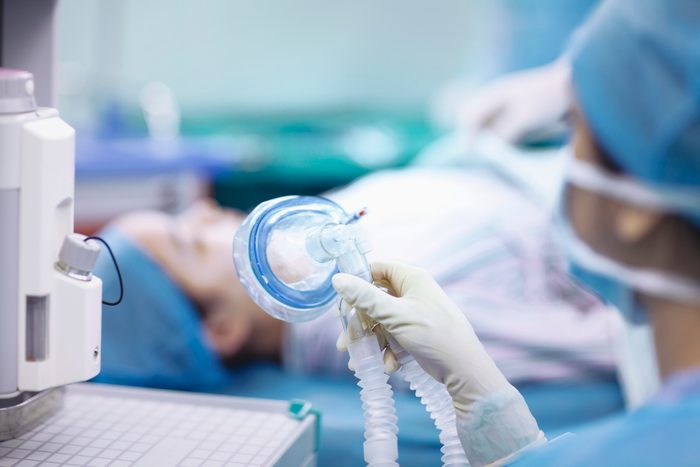
It’s not as painful as you would think
Hormone injections and egg retrievals sound painful but, while they’re by no means painless, they’re not as bad as you’d think. “Almost all the injections during stimulation are low volume and use tiny needles, which can be injected anywhere there is skin, typically in the belly near the belly button,” explains Dan Shapiro, MD, reproductive endocrinologist. “In fact, many patients may not even feel the injection at all and start worrying that they didn’t actually get the medicine when, of course, they did.” And, since egg retrievals are done in a procedure room under sedation, the patient neither feels pain nor remembers anything about the process. “The egg freezing process does not have to be disruptive towards activities of daily living,” says Dr. Copperman. “That night, a woman freezing her eggs can go out to dinner, have a glass of wine, and go back to work the next morning.” (Here are 11 surprising facts about fertility OB-GYNS want you to know.)

It can be expensive
How much does it cost to freeze your eggs? Let’s put it this way: The cost of egg freezing is what often separates those who think about the process versus those who actually do it.
“One cycle of egg freezing can cost around $10,000, and, often, two cycles are needed to have a healthy egg account,” says Dr. Ross. “Fortunately, companies like Facebook and Apple, are at the forefront of embracing and protecting a woman’s choice to delay motherhood and are championing their career-driven female employees by supporting them in the family-planning department.” (Here’s what men can do to boost their fertility.)

All egg freezing “centers” are not created equal
Like any scenario that involves making decisions for your health, you should avoid seeking out a sale, discount or deal of any kind. “Centers that offer reduced rates or low-cost egg freezing may be cheaper, but they may not be cost effective,” warns Dr. Talebian. It’s important to make sure you do your research before visiting and selecting a fertility center. “Some centers have way more experience than others, not only when it comes to how to freeze eggs, but also how to thaw eggs and help those eggs become viable embryos.” Like any other decision you’d make for your health, do your research.
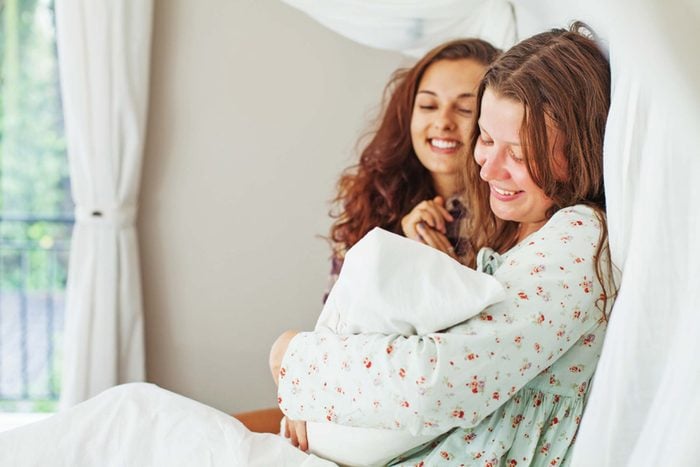
Egg freezing is better now than it used to be
The first birth from frozen eggs was reported in 1986 and involved using a little-known technique called “slow freeze.” But, because as many as 30 to 40 eggs were attempted to be thawed for each experiment, there was little interest in egg freezing until around the year 2000. “Private clinics, like Frozen Egg Bank Inc. in Orange County, California, helped develop more effective chemical solutions to improve survival and pregnancy,” explains David Diaz, MD, reproductive endocrinologist and fertility expert at Orange Coast Memorial Medical Center in Fountain Valley, California. “Success came in 2003, followed by the birth of California’s first frozen egg birth.” Since then, vitrification (AKA flash freezing) is rapidly evolving as the newer method and leading to an increasing number of births from egg freezing. The American Society for Reproductive Medicine (ASRM) has removed the experimental label from oocyte freezing. (Here are some surprising reasons you are not getting pregnant.)
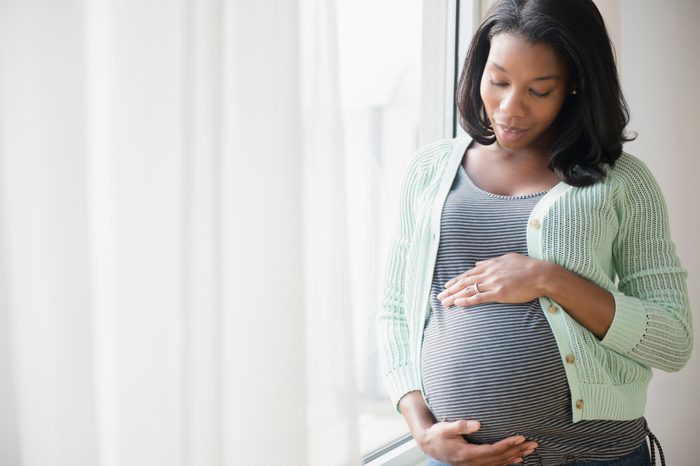
Egg freezing does not guarantee a future pregnancy
Like regular conception, there are no guarantees of pregnancy when it comes to egg freezing. “For this reason, it’s important to ask specific questions of a clinic—understanding the experience of their embryology laboratory (how many eggs have been thawed, fertilized, transferred, etc.) and how successful they’ve been in achieving healthy babies,” says Dr. Copperman. It’s important to note that the ASRM states that there’s not enough data to recommend women should freeze their eggs for the sole purpose of delaying childbearing. According to the ASRM 2012 report, “Patients who wish to pursue this technology should be carefully counseled about age and clinic-specific success rates of oocyte cryopreservation versus conceiving on her own, and risks, costs, and alternatives to using this approach.” “With healthy eggs, the success rate of an IVF cycle with your frozen eggs is similar to using a fresh egg— typically between 30 to 60 percent,” says Dr. Thornton. (These are the very early signs of pregnancy you might miss.)
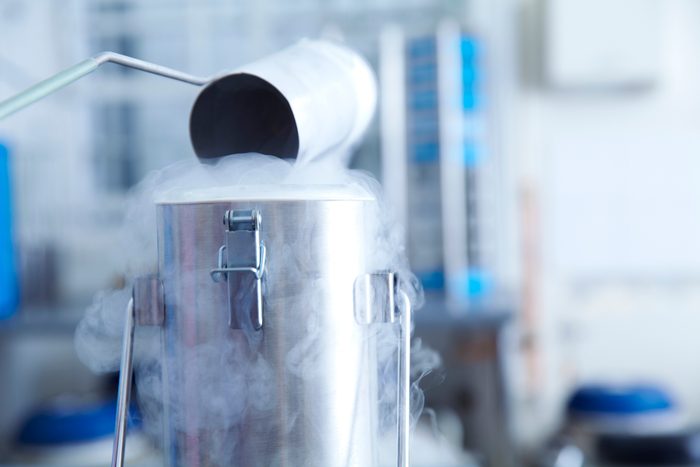
Scientifically speaking, frozen eggs can be stored indefinitely
“There have been numerous healthy babies born from eggs frozen for five to 10 years, with the longest reported successful thaw coming after 14 years,” says Dr. Klein. Theoretically, eggs have the potential to remain frozen for however long necessary, provided that they are constantly replenished with liquid nitrogen to maintain the freezing temperature at -190 degrees Celsius. “In our practice, seven years is the longest time elapsed from freezing to thawing that resulted in a live birth,” notes Dr. Diaz.
Next up: Find out 9 unexpected skin and hair changes during pregnancy.
